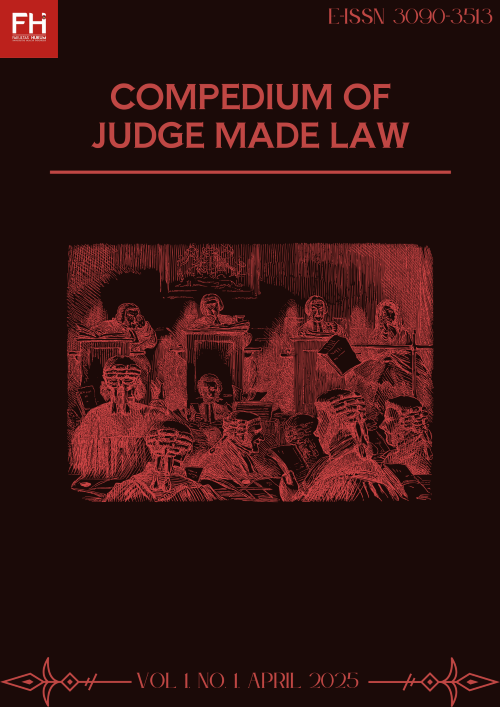The Death Penalty from the Perspective of Criminal Law and Islamic Law: A Comparative Study in Indonesia
DOI:
https://doi.org/10.56087/05etf156Keywords:
Death Penalty, Indonesian Positive Law, Islamic LawAbstract
Abstract: This study aims to analyze the application of the death penalty from the perspective of Indonesian criminal law and Islamic law. The study was conducted to identify common ground and principal differences between the two in upholding justice and protecting human values. The method used was normative legal research with a statutory and conceptual approach, sourced from primary, secondary, and tertiary legal sources through literature review. The results indicate that in Indonesian criminal law, the application of the death penalty is intended for crimes deemed beyond the bounds of humanity, such as drug abuse, terrorism, premeditated murder, and serious assault resulting in a cruel death. Meanwhile, in Islamic law, the death penalty (qisash) is imposed on perpetrators of intentional murder, adultery (muhshan), robbery (hirabah), rebellion (bughat), and apostasy. Islamic Sharia places the death penalty as an instrument of justice aimed at preserving life, social order, and human dignity. This study recommends that the implementation of the death penalty in Indonesia be accompanied by a clear time limit at each stage of the legal process to avoid legal uncertainty. In addition, interpretation of Islamic legal texts needs to be done contextually so that they are relevant to the development of modern legal systems and human values.
References
[1] A. C. Cindrapole and S. Rosmini, “the Legal and Ethical Implications of Surveillance in Criminal Law : a Literatur Review,” vol. 4, no. 1, pp. 448–455, 2024.
[2] N. Makrifah, “Hak Asasi Manusia Dalam Pandangan Islam,” At-Turost J. Islam. Stud., vol. 8, no. 1, pp. 17–31, 2021, doi: 10.52491/at.v8i1.52.
[3] H. J. Rahman, “Tinjauan Yuridis tentang Larangan Perbudakan Menurut Instrumen hukum HAM Internasional Dan Hukum Nasional,” Lex Soc., vol. 7, no. 3, pp. 110–118, 2019, [Online]. Available: https://ejournal.unsrat.ac.id/index.php/lexetsocietatis/article/view/24682
[4] E. I. Chief, “Kebijakan Hukuman Mati Ditinjau Dari Perspektif Hukum Positif Dan Hak Asasi Manusia,” Law J., vol. 1, p. 37, 2019.
[5] A. F. Fahmi, M. P. Perdana, I. Kamaluddin, and M. Nurhadi, “Aspek Kemanusiaan Dalam Hukuman Qiṣāṣ,” Ijtihad J. Huk. dan Ekon. Islam, vol. 15, no. 1, pp. 91–114, 2021, doi: 10.21111/ijtihad.v15i1.5109.
[6] N. Qamar et al., “Metode Penelitian Hukum (Legal Research Methods),” no. December, p. 176, 2017.
[7] C. A. Millenia and A. C. Cindrapole, “ISLAMIC LEGAL ANALYSIS ON SUSPECTS,” pp. 1–12, 1945.
[8] T. K. Revita Rensiana Br Sitanggang, “PENERAPAN ASAS ULTIMUM REMEDIUM DALAM HUKUM PIDANA: EFEKTIVITAS, TANTANGAN, DAN PERSPEKTIF PENGEMBANGAN DI INDONESIA”.
[9] T. Nopriandi and R. F. Ardhiansyah, “Paradigm of Death Penalty (Comparative Study in Indonesia, Saudi Arabia and China),” Lampung J. Int. Law, vol. 2, no. 1, pp. 57–68, 2020, doi: 10.25041/lajil.v2i1.2032.
[10] E. Hukum and D. A. N. Hukum, Antonius Sudirman_Eksistensi Hukum dan Hukum Pidana.
[11] N. A. R. S. Ika Noerwulan Fraja, “Perbandingan Hukum Pidana Mati Di Indonesia Dan Belanda,” Divers. J. Huk., vol. 7, no. April, pp. 50–75, 2021.
[12] M. A. Rahmawati, F. Firdaus, and ..., “Dimensi Pemidanaan Dalam Perspektif Teori Utlitarianisme Hukum,” Das Soll. J. Kaji. …, no. 2023, pp. 1–19, 2024, doi: 10.11111/dassollen.xxxxxxx.
[13] D. M. Putri, “Hukuman Pidana Mati dalam KUHP Baru dan Perspektif Abolisionalis serta Retensionis,” Eksekusi, vol. 2, no. 4, 2024.
[14] P. Asfi, “Komparasi Politik Hukum Undang-Undang Nomor 1 Tahun 2023 Tentang KUHP,” 2024.
[15] T. Pipit Muliyah, Dyah Aminatun, Sukma Septian Nasution, Tommy Hastomo, Setiana Sri Wahyuni Sitepu, Pidana Denda “‘Sanksi Alternatif antara Teori,’” vol. 7, no. 2. 2020.
Downloads
Published
Issue
Section
License
Copyright (c) 2025 Agus Alim Yusuf Alim, Nasrullah Arsyad, St Ulfah

This work is licensed under a Creative Commons Attribution-ShareAlike 4.0 International License.


